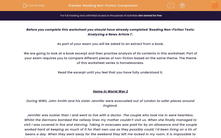Before you complete this worksheet you should have already completed 'Reading Non-Fiction Texts: Analysing a News Article 1'.
As part of your exam you will be asked to an extract from a book.
We are going to look at a book excerpt and then practise analysis of its contents in this worksheet. Part of your exam requires you to compare different pieces of non-fiction based on the same theme. The theme of this worksheet series is homelessness.
Read the excerpt until you feel that you have fully understood it.
Home in World War 2
During WWII, John Smith and his sister Jennifer were evacuated out of London to safer places around England.
Jennifer was luckier than I and went to live with a doctor. The couple who took me in were heartless. Whilst the Germans bombed the railway lines my mother couldn’t visit us. When she finally managed to visit I was covered in lice and starving. Taking in evacuees was paid for by an allowance and the couple worked hard at keeping as much of it for their own use as they possibly could; I’d been living on a tin of beans a day. When they went away for the weekend they left me locked in my room. It is impossible to forget the isolation and the dark, curled up like an embryo and crying for my mum, not sure that I would ever get out and feeling that I had been like this forever. The trauma of that experience has left me claustrophobic, terrified of being locked in small spaces, and I have an extreme hatred of any kind of child abuse that fuels all my charity work for children, particularly with Barnados. My mother decided on the spot that the risks of bombing were preferable to being locked up, starved and neglected and took us both back to London, never to be parted again.
The London Blitz was in full swing by then. As the bombs landed closer and closer my mother grew increasingly restless. Dad was called up into the army and she moved us up north to a small village in Norfolk.
As it turned out in the end, WWII was good to me. I was a skinny little street urchin who escaped from the smog and filth of London to the paradise that was Norfolk. I was a tiny mite when I arrived there but by age sixteen I was six foot tall, like a foxglove shooting up in a meadow. We had good food. Rationing meant no sugar, sweets or cakes and little fat, and additional, natural goodness that came from the wild; rabbits and moorhens’ eggs. The production of explosives absorbed all chemical fertilisers so everything was organic, giving us a surprisingly healthy start in life. The old farmhouse we lived in was crammed with nine other families, but there was fresh air, great food and the freedom to roam in the countryside. I hung out in a gang of evacuees. We were rough and our language was less than proper to say the least, so the village mothers wouldn’t let their kids mix with us. On reflection, looking back, we must have been rather antisocial but the experience in Norfolk changed my life. I valued the countryside because I went to live there, and I valued London because I left it behind.
The text of the news article you will compare this to is provided below:
Life on the Streets
A journalist has a sponsored overnight sleepover on the streets of London to support the homeless charity Street Fighters.
After sleeping rough overnight with a blanket, I thought that I was lucky. The worst thing that happened was discovering after a downpour at 4.00 a.m. that a soggy blanket does not keep you warm. However, when I compared this with all the other possible homeless sleepover disturbances that could have happened – muggings, rats, being moved on, someone stealing your precious blanket - I realised that I’d got off lightly. Simple rain was tolerable.
Moreover, it wasn’t cold that night. As I went to sleep sometime after 12 a.m., I was glad to be sleeping on a relatively comfy bench in a park in the centre of London. It felt safe compared to shop doorways or cramped telephone boxes: the usual places that homeless people are forced to choose at night in a UK city.
One hundred people had volunteered to sleep outside for the night in August to fundraise for the London-based charity Street Fighters. The charity works amongst the homeless providing a soup kitchen, breakfast club, buddying group and an in-depth counselling project for those most alienated or whom the system has failed.
Street Fighters held the event to promote appreciation of the plight of the homeless in London. CEO Olive Sands estimates the number aided by the charity at around 350 to 500, although in a large city the true quantity of citizens sleeping rough cannot be known.
We gathered at Hyde Park around 11p.m. On a near=midnight walk through the city centre Olive showed us places most familiar to those sleeping rough. One where Street Fighters once provided soup kitchen facilities, near a large railway station, had to be abandoned after locals complaints forced its closure following a campaign of throwing dirty water out onto the street.
After a rough sleeper’s midnight feast of hot chicken soup from the soup kitchen we were left to find our own way to settle down for a night’s sleep in the middle of the capital city of England.
The worst moment of my rough sleepover was the downpour at 4 a.m. However, I only spent one night under a soggy blanket. All the participants realised fully that our experience was nothing compared to the hundreds of people forced to spend every night on the streets.
Now answer the questions on the texts. You can refer back to them at any time by pressing the 'Help' button.







